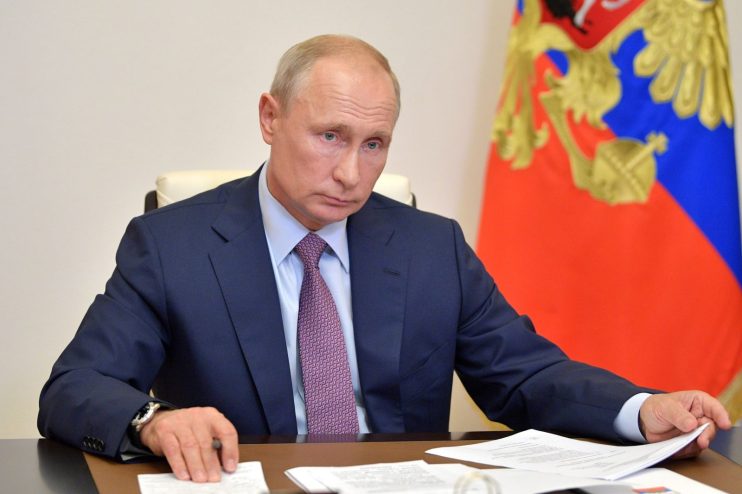Fighting Russian and Chinese disinformation requires a cohesive strategy from Western governments

Given the world of the internet and multiple platforms, there is undoubtedly more content out there than at any other time in the history of man.
Unfortunately, and predictably, along with this news explosion, the very unhealthy scourge of state-sponsored disinformation–with the West’s authoritarian foes trying to take advantage of this editorially unregulated Wild West of content—has followed in the internet’s wake.
This basic conundrum of our age has reared its ugly head most recently during the Covid-19 crisis. In October last year, Foreign Secretary Dominic Raab accused Vladimir Putin’s Russia of mounting a worldwide disinformation campaign aimed at eroding the credibility (and hence the efficacy) of the West’s Covid-19 vaccines.
Read more: Russia’s Sputnik news agency halts operations in Britain
Beyond targeting the West, this state-sponsored disinformation campaign has been specifically directed at countries such as Brazil, India and Indonesia, in an attempt to discredit the highly effective western vaccines. In part, this would help to build markets for the Russian-sponsored Sputnik V alternative.
Confirming Raab’s fears, a European Union task force also came to the same conclusion, accusing the Kremlin of launching a disinformation strategy involving fake news, social media manipulation, and propagating conspiracy theories as key elements of this campaign.
For example, Russia has, through third parties, paid online influencers to run disinformation ads on their highly-travelled social media platforms. Russian state-controlled media sources, in a boomerang effect, then pick up on this Kremlin-generated disinformation from abroad, and report on the manufactured growing western public skepticism about the vaccines.
For instance, in September 2020, Vesti News, a flagship public affairs program broadcast by Russian state-controlled television, included images portraying Oxford’s AstraZeneca vaccine as a “monkey vaccine”, sowing ridicule and fear in equal measure.
While it is surely true that the Oxford vaccine was tested on monkeys (as most vaccines are) and that it uses a chimpanzee virus as a vector, the contextual reality that this is entirely routine was entirely omitted.
Read more: Hospitality industry slams vaccine passports as ‘Hobson’s choice’
General Sir Nick Carter, Chief of the British Defense Staff, has accused the Kremlin of engaging in political warfare over the vaccine question, purposely seeking to encourage gullible western conspiracy theorists and anti-vaxxers, slowing down the West’s recovery from this horrendous pandemic.
China, following in Russia’s footsteps, has also engaged in a disinformation campaign, attacking western vaccines. Beijing uses large numbers of fake social media accounts to spread disinformation abroad, all the while its tightly state-controlled media domestically manages the pandemic conversation at home.
Chinese strategic disinformation goals are somewhat different: to distract its many critics from focusing on Beijing’s undeniable culpability in facilitating the spread of the virus. It seeks to highlight American failures in dealing with the Covid-19 crisis, while pointing out China’s relative successes. The overarching objective is to point out that Beijing is on the global rise while America is in relative decline.
A recent study by the US State Department found China, Russia, and Iran are increasingly carrying out common disinformation narratives about the US and the virus.
So, what are we to do? Three general points are crucial.
First, let the free market work its magic. Experimental platforms are coming online based on solving this precise riddle. For example, Pixstory—a new social media platform where users’ trust scores are based on the factual credibility of the posts they choose to share—values accuracy above the number of hits a post engenders. This market-driven solution goes a long way towards solving the disinformation problem, because concerned citizens are free to join in searching for facts-based platform alternatives to what is going on today.
Second, western governments must remember the old Cold War strategic reality that propaganda is part and parcel of the overall global geostrategic competition; the Biden administration must regularly (via press conferences and other social media means) call out Russia and China and other rogue nations, discrediting them globally—on a specific case-by-case basis, if possible–as untrustworthy propagators of disinformation. They must continue to cast western facts-based governments as looking at the world as it truly is. This is one of the West’s greatest innate strengths; we should not shy away from saying so.
So, third, when President Biden finds himself standing next to Presidents Putin or Xi, he should regularly, in front of the world’s press, take them to task over sowing disinformation. It is past time the West took the narrative fight to those spreading lies for their own purposes. The founders of the western world rightly recognised that a free, facts-based press was the most revolutionary force on earth. It is high time that we, their successors, take up this common mantle, recognising that safeguarding this treasure will continue to set the world free.